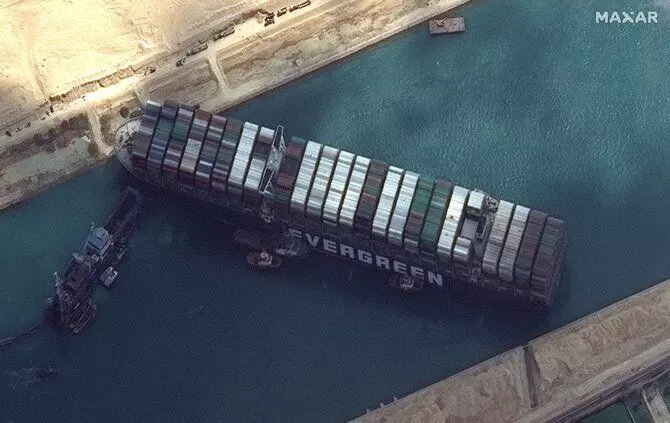

Explainer: How the now refloated Ever Given in Suez Canal strikes the international economy
text_fieldsThe Suez Canal is a vital sea route that has its path connected with the Mediterranean Sea and the Red Sea, making it the shortest seafaring route from Europe to Asia. The 120 miles long man-made waterway was built in Egypt and has been on since 1869.
Even though the Suez Canal is a strain, approximately $9.6Bn worth of commodities are transported daily, which values at 12 per cent of global trade, according to stats from Lloyd's List. About 90 per cent of global trade commodities are passed via sea, making it so crucial to reopen the waterway.
Since 2014, the strain is being expanded by the Suez Canal Authority (SCA) to elevate its daily passage capacity from 49 vessels to 97 by 2023.
The blockage would mean sea carriers to Asia would have to travel around Cape of Good Hope through southern Africa like the old times. At the current passage level, the canal lets over 17,000–19,000 vessels each year.
The international impact
Though the impasse situation of the Taiwanese firm Evergreen's giant vessel was resolved , the countries affected will have to face a drag of demand-supply chains. The pandemic-caused disrupted trade was only just leaving harbours and with countries dependent on the canal for its trade, has now witnessed a crazy-dip in the need for consumer goods and commodities, energy from Asia and the Middle East.
Reports show that the incident has already ceased over 10 ten crude tankers carrying 13M barrels of oil as 5-10 per cent of all oil sea transported is through the Suez. Several freighters with jet fuel and gas oil on board and empty tankers crossing to pick up North Sea oil are held up. As for rerouted ships, additional 15 days were further added to their crossing, which experts say would increase shipping times by up to 30%.
Talking about the most hit, the Syrian oil ministry has been limiting the distribution of fuel in the country while battling the already sunk-in humanitarian crisis, as the UN names it. With just a quarter underway, the prices of cooking gas, fuel and related products were already on a hike as the Syrian government raised it earlier by more than 50 per cent in the third increase this year.
Will the blockage detached be enough?
Although the vessel was refloated after the seven-day blockage and the busy waterway continues passage, the stuck containers are likely to reach busy ports, taking additional days to offload the products. As the demand shoots up, the product-in-demand itself increases the cost.
Also, the canal's geopolitical importance could be another reason to widen the already widened gap between the developed and the developing countries.

















